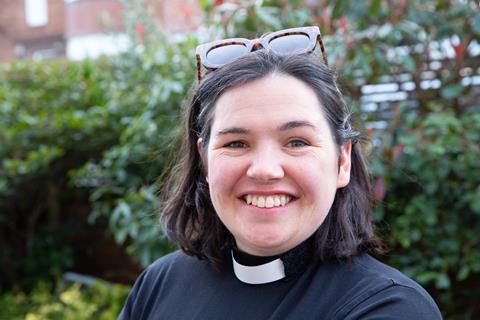‘The story of Mary and Martha was radically significant for me, Jesus invited Martha to follow the example of Mary. Not radical because he told her to leave the washing up and cooking, but because he celebrated the choice of Mary,’ says Rev Jo Trickey.

Have you ever been in a situation where everyone else can see something about you that you can’t? I had years of people identifying my gift of leadership and I didn’t really believe them. It wasn’t something I set out to be, it was just what came naturally. I’ve always been able to galvanise people to join in with something, which I just saw as encouraging or to take a lead on decisions, which I described it to myself ‘just getting on with it’. I was perceptively described as ‘gently disruptive’ something that I have learnt over time is a key part of my leadership style. Latterly I’ve learnt that other people were seeing God’s calling on my life before me.
READ MORE: A powerful testimony of what happens when women support women
My education was in a very academic series of girls schools where we were encouraged to push through the glass ceiling. Yet, what I was finding taught in church was that men alone should lead churches, ordination was reserved for them. A position that as a young woman I agreed with. I grew up in churches with a fantastic emphasis on Bible teaching, and wrestling with Scripture. Yet often when I asked questions about women in leadership, from people on both sides of the debate, what I found in the answers was to be honest, a bit fluffy and a underdeveloped.
I think one of the most frustrating was the idea that it was fine for women to lead and teach in children’s ministry, as if early years education isn’t fundamentally formative!
I would ask some why they felt it was biblical for women to be leaders and get offered lots of experiential reasons. I would ask others how they worked out their theology of male headship in practice and get answers that were full of practical contradictions. I think one of the most frustrating was the idea that it was fine for women to lead and teach in children’s ministry, as if early years education isn’t fundamentally formative!
READ MORE: A league of extraordinary women
In brief, I kept coming back to Jesus, pondering ‘How did he treat women? What did he offer them and ask of them?’
In brief, I kept coming back to Jesus, pondering ‘How did he treat women? What did he offer them and ask of them?’ The story of Mary and Martha was radically significant for me, Jesus invited Martha to follow the example of Mary. Not radical because he told her to leave the washing up and cooking, but because he celebrated the choice of Mary. The choice to sit at his feet among the disciples. To become a disciple, and in time to do what all good disciples do, follow the way of her master and share his teaching with others. He celebrated her decision to join the men and learn with them. I started looking for other women in Jesus’ sphere: there’s Mary his mother, blessed with the first news of the coming Messiah; Elizabeth who recognises her Lord and celebrates; there’s the woman at the well in John 4, who tells others about Jesus and they believe on her testimony that he is the Saviour of the World; the women who first encounter the resurrected Jesus and go rushing off as the very first evangelists.
READ MORE: One of the ways the Church can combat abuse is by considering its traditionally male hierarchy
What then of the early church? Well there’s not a lot to go on, but any mention of women leaders in a patriarchal society is significant and shouldn’t be brushed aside. So there’s Priscilla, and Lydia, Phoebe, and Junia. Each significant in their own way. My dissertation was on the household codes in Ephesians and Colossians, radical in their time because the call to mutual submission puts Jesus at the centre of every relationship dynamic.
Eventually my theological position changed and later I felt a sense of calling to ordained ministry. I have the greatest of love for my dear friends who disagree with me on this. I know that our disagreement is because we look at the same passages of Scripture and notice different things. I know that it’s because we both love Jesus and want to honour him. I love that they provoke me to time and again to look at my theology of women, to examine it, and to fall more in love with Jesus as I see his love for me and respond to his call.

































2 Readers' comments